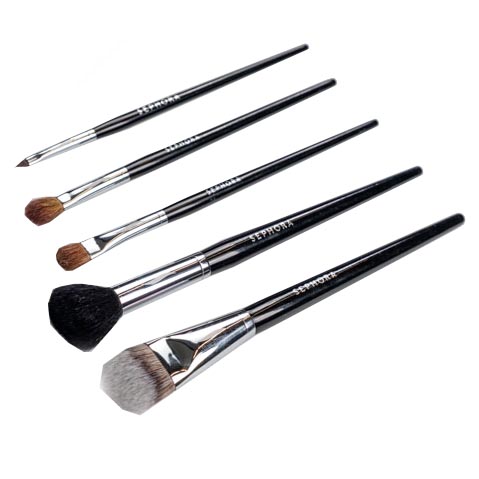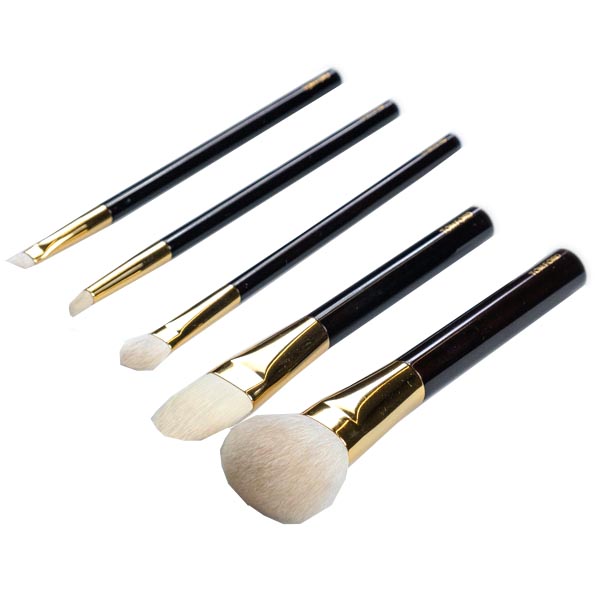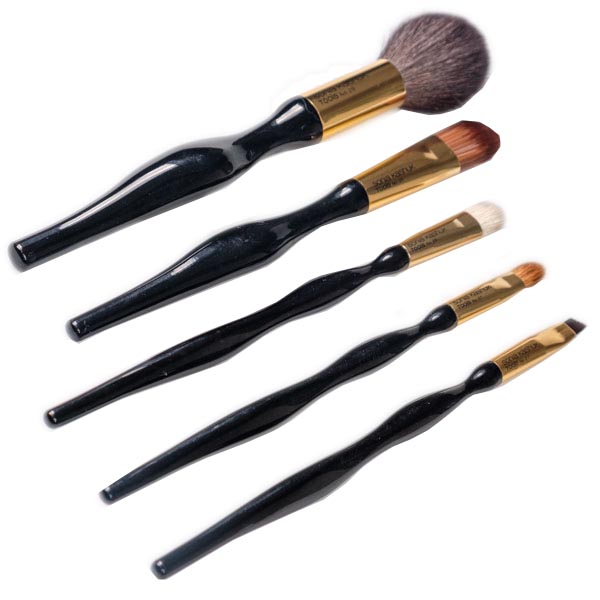Brushes that make the most of your makeup
This Great Post Originally Appeared On Reviews.com Here
THE BEST MAKEUP BRUSHES [FROM REVIEWS.COM]
When you sit down at your vanity to get ready for your day your best friends are your makeup brushes. The right brush not only will feel good but will allow you to take your look to the next level. We all know there are a thousand different options out there and many of them can put a dent in your wallet. What it really boils down to is what is important to you. Are you looking for a budget-friendly option? Or is having the absolute best of the best at any cost your priority?
Whatever you are looking for head over to Reviews .com and check out their guide to makeup brushes. They outline what qualities to look for in a brush like softness, durability, and grip then take it a step further and give you quick tips on maintaining your new tools!
The 30-Second Review
Whether you prefer drugstore sets or individual designer brushes, the best makeup brushes should be functional and stylish. We spoke to dermatologists and makeup artists to understand what to look for, and then hand-tested 70 brushes from 16 popular brands. Our favorites were lovely to look at and easy to hold, with soft, yet durable bristles.
Our Top Pick
Sephora’s brush line hit all the notes we wanted: soft, dense bristles that applied makeup evenly, plus handles that were elegant and easy to grip. The brand’s wide variety of brush types and finishes make it a great option for makeup enthusiasts who want to begin building their brush collections, with individual brushes ranging from $20-40. Sephora also offers a variety of gift sets for special occasions.
Best Luxury Brand
Tom Ford
Astoundingly soft bristles plus well-balanced handles give these brushes a level of precision we didn’t find at lower price points. But their luxe performance will run you $50-$115 per brush.
Best on a Budget
We found this brand’s handle design less comfortable than our other picks, but the $2-$20 brushes offer even makeup application for those on a budget.
The Best Makeup Brushes
- SephoraOur Top Pick
- Tom FordBest Luxury Brand
- Sonia KashukBest on a Budget
If you’re a makeup enthusiast, you know that the best makeup brushes can give your daily routine an invaluable precision boost. A well-designed brush will have soft, springy bristles that hold their shape well — allowing you to apply just the right amount of product — plus a comfortable handle that lets you adjust your grip from the tight control of applying eyeliner to the looser application of blush or finishing powder.
For anyone looking to build up a collection of reliable brushes for daily use, we loved the quality of the Sephora Collection ($20-$40 per brush). Their slim, tapered handles are easy to grip, and the brushes deposit makeup smoothly and evenly, keeping their shape well with minimal shedding post-wash. We also appreciated the sheer range of Sephora’s offerings, from its essential brush collection to sparkly holiday gift sets and collaborations with major makeup names like Hakuhodo. Whether you’re collecting go-to brushes for your personal routine, or hunting for the perfect gift for a makeup-loving friend, Sephora has you covered.
We were blown away by Tom Ford’s luxurious brushes ($47-$115). Though pricey, their quality was mesmerizing. The brushes have extremely soft, dense bristles and perfectly balanced mahogany handles that allowed for a level of control less expensive brushes just couldn’t replicate. Besides applying your makeup flawlessly, the brushes are beautiful enough to just display on your vanity, thanks to deep red-brown handles, gold metal ferrules, and white bristles. We didn’t want to part with them.
If you’re a newcomer to makeup and aren’t ready to spend a lot, or if you just want decent brushes without bleeding your pocketbook dry, we’d recommend Sonia Kashuk($2-$20 per brush). During testing, these brushes beat out more expensive contenders like MAC thanks to their soft, full bristles, although some of our testers disliked Sonia Kashuk’s handles, which have bulbous curves that make it hard to control exactly where you grip each brush. Sonia Kashuk does stands out for being cruelty-free — if animal testing is a no-go for you, this brand has historically taken a strong stance against it. (We dig into the details of what “cruelty-free” actually means below.)
How We Found the Best Makeup Brushes
We chose brands that makeup lovers were excited about.
We cast a wide net in our search for excellent brushes. Our list began with best-sellers from beauty retailers like Sephora, plus award-winning brushes from Allure and Vogue“best-of” lists. Then we asked professional makeup artists, salesclerks at Sephora, and amateur enthusiasts in our own office for their recommendations. And the suggestions came pouring in: Makeup lovers are passionate about their brands, and everyone we spoke with had a different list of favorites.
So we sampled a little of everything, looking at luxury brands like Marc Jacobs, plus e.l.f.’s $2 Target eyeshadow brushes. It’s not a comprehensive list. We had to skip over favorites like Smashbox and Laura Mercier, though we hope to continue updating this review. But we ended up with a range of price points and designs that we were excited to try out.
- Artis
- Chanel
- Charlotte Tilbury
- e.l.f.
- Tom Ford
- Marc Jacobs
- NARS
- Lancome
- Sigma
- Bobbi Brown
- MAC
- Sephora Collection
- Tarte
- Real Techniques
- Sonia Kashuk
- Skinny Dip
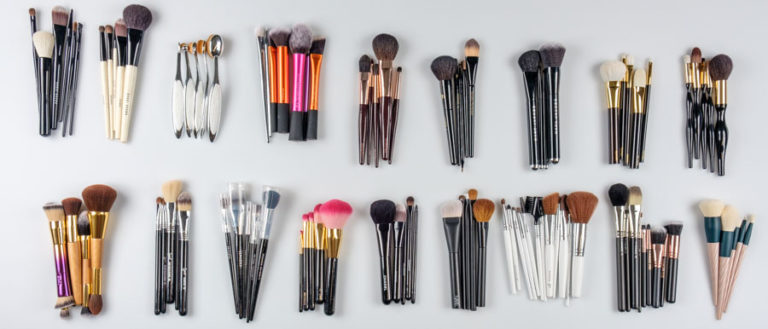
We sorted through every brand’s offerings and chose five brushes from each: a liquid foundation brush, a blush brush, a general eyeshadow brush, an eyeshadow smudge brush, and an eyeliner brush. If the brand had a gift set available, we bought that too — we’d heard rumors that some brands try to cut costs on gift sets, and we wanted to check for ourselves. Then we sat back and waited for all 70 makeup brushes to arrive at our office.
We hand-checked the brushes for softness, durability, and grip.
Several factors will indicate whether a brush is worth the money before you even apply makeup. Caitlin Picou, owner at Kismet Cosmetics, told us there are “two big things to look for: softness and fallout. You want a dense brush (meaning thick and full of hairs), but if it feels scratchy at all, stay away. And if you brush it against your skin and hair falls out, don’t buy it.” Removing the brushes from their boxes, we tugged lightly to look for any initial shedding — Lancome was a surprise offender, with its $65 limited edition gift set leaving black hairs behind on the counter.
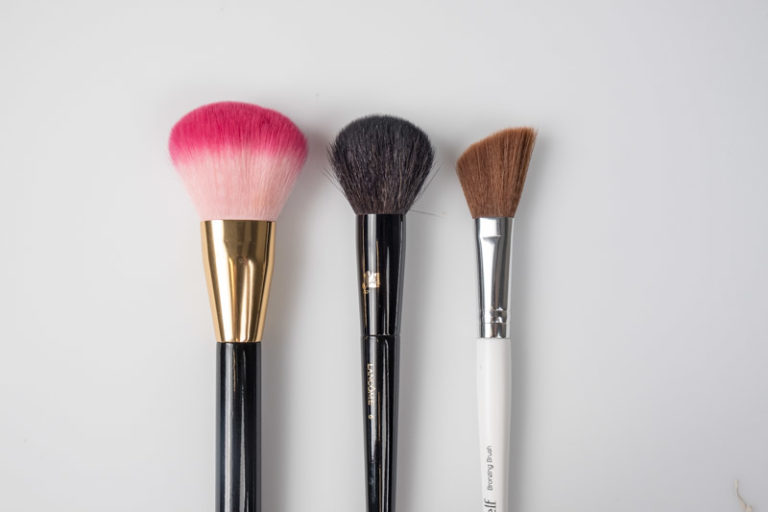
Lancome’s $43 blush brush (center) was sparser than the $16 Skinny Dip (left), with more stray bristles than our $2 e.l.f brush (right).
Picou also suggested keeping an eye on handle design — the best makeup brush should feel comfortable to hold. Artis and Tarte underwhelmed us here. Tarte’s foundation brush was quite soft, but we found its double-ended design awkward and prone to smearing makeup if propped on a bathroom counter. The gummy plastic grips on the Artis line’s handles looked cool, but began to pick up stray bits of hair and lint once we unpackaged them. We applaud these brands for trying something new, but we ultimately preferred the classic, tapered profiles of brands like Sephora.
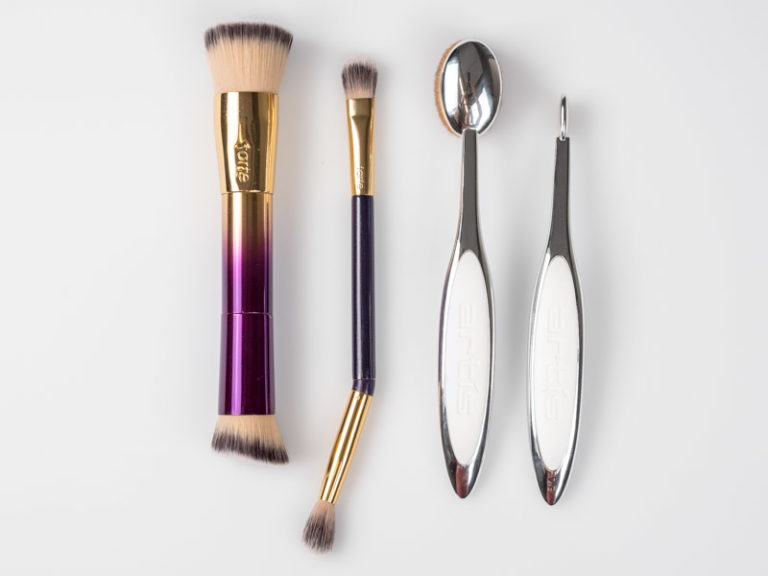
From left, a pair of unique options from Tarte and Artis.
Then we swatched makeup and cleaned our brushes.
To test the brushes’ maneuverability and ability to deposit color evenly, we purchased liquid foundation, gel liner, powder blush, and eyeshadows to swatch against white Bristol board, similar to the face charts used by makeup artists.
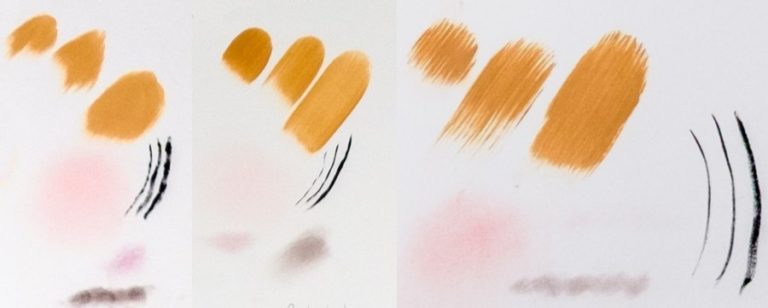
From left, test results for Lancome, Sonia Kashuk, and the MAC gift set.
MAC and Lancome didn’t fare well. Lancome’s brushes were sparser and coarser than even some budget brands, its eyeliner brush producing thick, uneven streaks. We also had trouble mustering enthusiasm for the shiny pleather case its gift set ($65) arrived in. But the “most disappointing gift set” award ultimately went to MAC. The brushes in its $50 set were half the size of its solo brush line and noticeably sparser, with a cheap, lightweight feel that made them feel like prizes from a gumball machine. MAC’s full-sized brushes ($20-$35) fared better, but we ultimately preferred the precision offered by Sonia Kashuk ($2-$20) and Bobbi Brown ($30-$60), brands that provide consistent quality regardless of whether you’re buying a set or a solo brush.
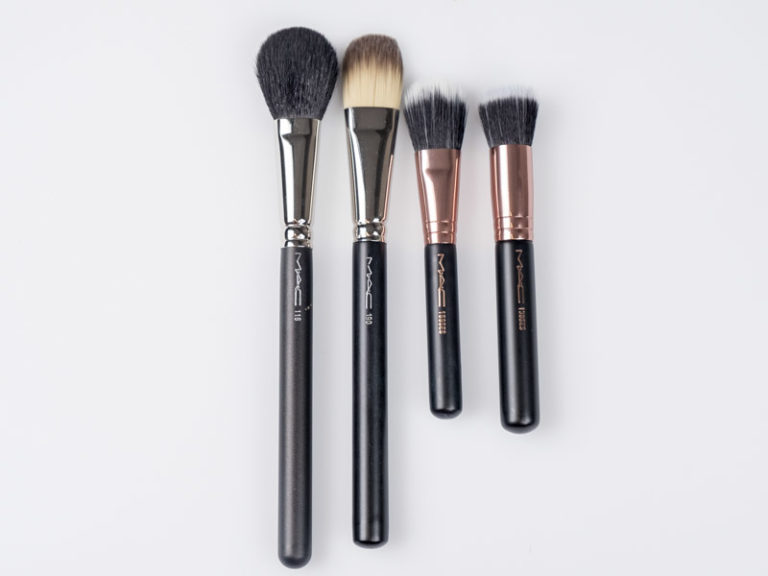
MAC’s solo brushes (left) are significantly larger than its $50 gift set options (right).
Cleaning was straightforward for most of our 70. We were impressed by the Sonia Kashuk Limited Edition Set’s ability to stay pristinely white post-wash, and Sephora and Sigma were similarly painless. But we had trouble removing all of the foundation from Real Technique’s foundation brush, and Tarte’s double-ended foundation brush took 12 hours to dry completely, leaving behind a faintly musty smell.
We used our finalists to apply our daily makeup.
After swatching and cleaning, we chose the highest performers to try out on our faces. Our finalists were Sonia Kashuk, e.l.f., Sephora Collection, Bobbi Brown, NARS, Chanel, and Tom Ford. We assigned each brand to a tester accustomed to wearing face makeup and asked them to use the brushes per their normal routine. All seven of our finalists have a lot going for them, with testers reporting an overwhelmingly positive experience. But our favorites have subtle design and construction details that delighted us.
It’s also worth noting that some individual brushes succeeded or failed more sharply than their comrades. “One brand can’t be all things to everyone,” Mindy Green, makeup artist and owner of MG Beauty, pointed out. “I can name six brands that I have in my primary brush set. One brand has the crease I like, but another has a foundation and blush that I like.” Our top picks had strong performance in multiple areas, but we’ve also called out a few brushes within those brands that we particularly loved (or hated).
Our Picks for Best Makeup Brushes
Our Top Pick
SephoraGreat performance and classic design at a reasonable price.
If you’re a daily makeup user looking to build a collection of reliable brushes, we think the Sephora PRO Collection ($20-$40 per brush) is the best place to start. Compared to budget picks like Sonia Kashuk, Sephora Collection brushes are softer, denser, and less prone to shedding when you clean them (though they don’t quite match the sensory delight of Tom Ford’s fluffy bristles).
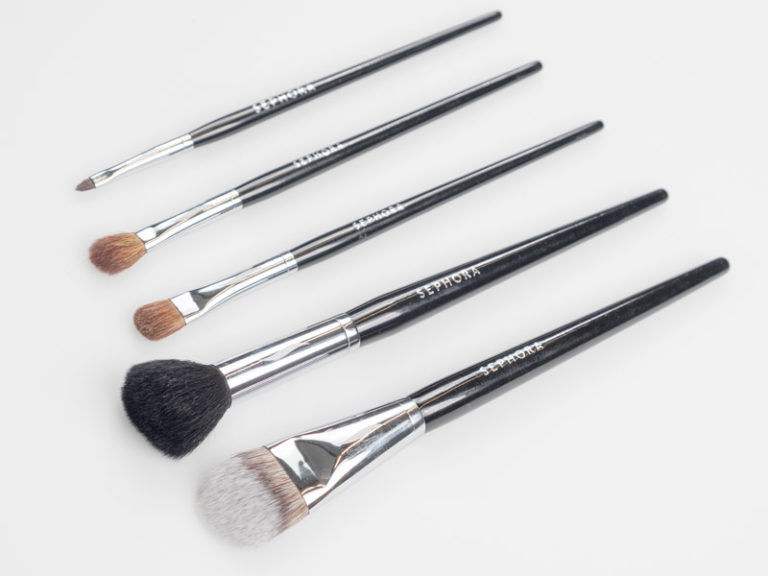
The brushes have a classic design: very long, thin black handles that felt well-balanced and easy to grip at any point along their length, so that you can easily adjust your level of precision. Compared to the neon pink Skinny Dip or the space-age look of the Artis, the Sephora PRO line isn’t trendy, but its classic design has staying power. The only serious competitor in this price range was Sigma ($15-$30), which performed similarly during swatch tests, but whose handles felt bulky compared to Sephora’s and boasted holographic lettering that looked as though it would scrape off quickly. Sephora was also the only brand we tested to provide a reusable, locking plastic cap with each brush. Even high-end brands like Marc Jacobs and NARS just used plastic tubes or sleeves. Sephora’s design keeps the brushes clean and prevents them from getting crushed if you’re traveling.
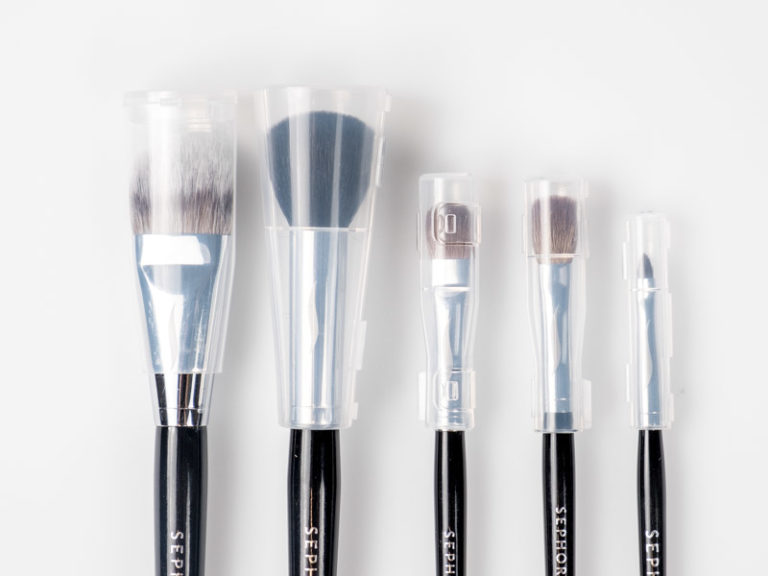
Of the brushes we tested, Sephora’s eyeshadow, foundation, and blush particularly excelled, applying makeup with light, even coverage. Our eyeliner was the only selection that fell slightly flat: While decent, it lacked the razor precision of pricier options like NARS and Chanel. We also noticed more shedding versus brands at higher price points — including a single, errant hair poking out of the top of our eyeshadow brush after we washed it.
The next step up in luxury
ChanelA luxury option that fills the gap between Sephora and Tom Ford.
If you’re looking for slightly higher quality, we’d suggest Chanel ($32-$60) as the next step up. These brushes push the “mid-range” limit, but our Chanel tester was smitten, describing her brushes as “honestly a dream” — especially Chanel’s extremely precise eyeliner brush, which had dense, soft bristles, smooth application, and no shedding. However, Chanel’s options are more limited: The brand includes a couple dozen brushes, versus over 100 from Sephora (including a wide range of gift sets). If you’re still figuring out your preferences and want to experiment with brush designs, Sephora gives you the space to do so. Chanel is better if you already know what kind of brushes you use and are ready to invest in a brand.
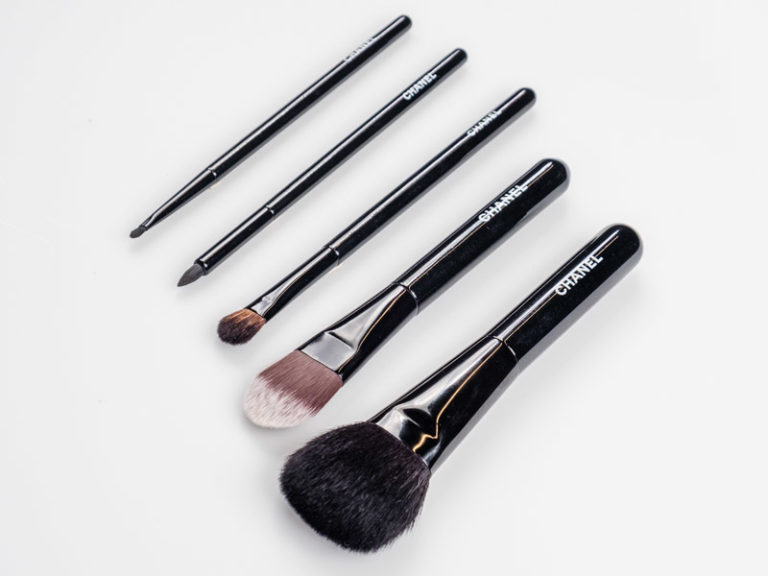
Best Luxury Brushes
Tom FordThese brushes are pricey, but incredibly soft and dense.
All of our high-end brushes, from Chanel to Marc Jacobs, were excellent, holding their shape and performing well with minimal shedding. But Tom Ford ($47-$115) beat out the competition in terms of sheer quality and attention to detail. For luxe gift-giving (to others or yourself), it doesn’t get much better than these brushes, which are handmade in Japan, where artisan brush-making is a centuries-old tradition. With extremely dense, soft white bristles and lacquered mahogany handles, they serve double duty as both tools and decor on your makeup vanity. The biggest con is price: For most people, these are an investment piece rather than an impulse buy.
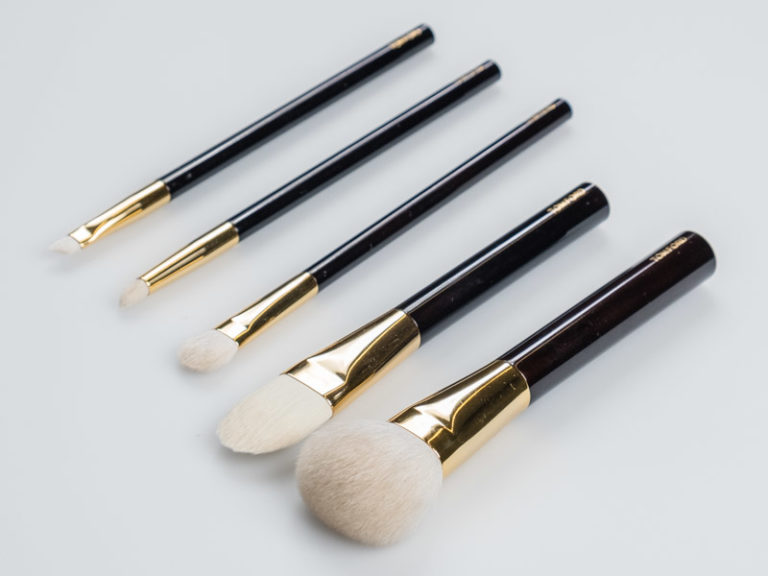
These brushes had the densest bristles of all the brands we tested, drawing high praise from our at-home tester, who loved that they didn’t soak up any makeup, allowing her to make the most of every bit of product. She reported that her makeup also applied more evenly with Tom Ford than with less expensive tools, making it easier to achieve a dewy, natural skintone. “I would adore having these brushes,” she told us. “I can’t believe how smoothly they applied every type of makeup. SOLD.”
And it’s not just the bristles. We were blown away by Tom Ford’s handles — they feelexpensive, one in-office tester noted, with the type of carefully balanced weight you might expect to find in a concert violinist’s bow or the paintbrush of a master artist. The end result is that these brushes do the work for you, providing breathtakingly natural results with minimal effort.

Tom Ford’s blush brush (left) was far denser than low-end brands like e.l.f. (right).
On a more pragmatic note, despite Tom Ford’s white bristles, we found the brushes easy to clean. They retained their creamy color and lost zero hairs when we washed them, springing beautifully back into shape when dry.
Tom Ford’s main weakness is its lack of eye makeup options. The brand offers four lovely eyeshadow brushes, but its single eyeliner brush has been discontinued. So if you’re an eye makeup junkie, we’d suggest supplementing your collection with NARS or Chanel. The NARS Push Eyeliner Brush offered some of the finest, most controlled lines we were able to achieve (although testers noted its bristles weren’t particularly soft). But be aware that the NARS line provides a very sharp, dramatic look. If you want a more natural face, we’d suggest Chanel’s eyeliner brush instead.
Unlike most of the luxury brands we looked at, Tom Ford does offer a gift set, the Soleil Brush Kit, but it costs a staggering $850 for four brushes — far more expensive than buying them individually (although, to be fair, you do get a nice leather case). If you’re looking for a high-end gift at a slightly less outrageous price point, we’d suggest Bobbi Brown’s $250 set instead. The brushes are closer in quality to Chanel than Tom Ford — in that they’re lovely, but not quite the pinnacle of luxury. But you get an elegant set of black-handled brushes in a debossed, faux-leather case — a more well-packaged gift option than the “set” we looked at from Marc Jacobs, which turned out to be nothing but the brand’s solo brushes, shipped together in the same plastic bag.
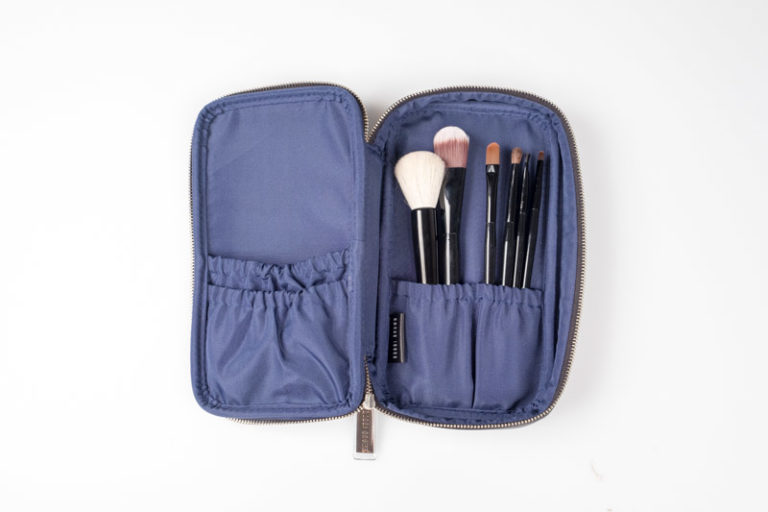
Bobbi Brown’s brush set is an elegant high-end option for gift-givers.
Best Budget Brushes
Sonia KashukA versatile range of entry-level brushes that we loved.
Whether you’re just beginning to use makeup brushes and don’t want to spend a lot of money, or you’re a more experienced user sticking to a budget, we were fans of Sonia Kashuk’s diverse range of reasonably priced brushes ($2-$18). In fact, we thought they actually performed better than more expensive brands like Lancome and MAC.
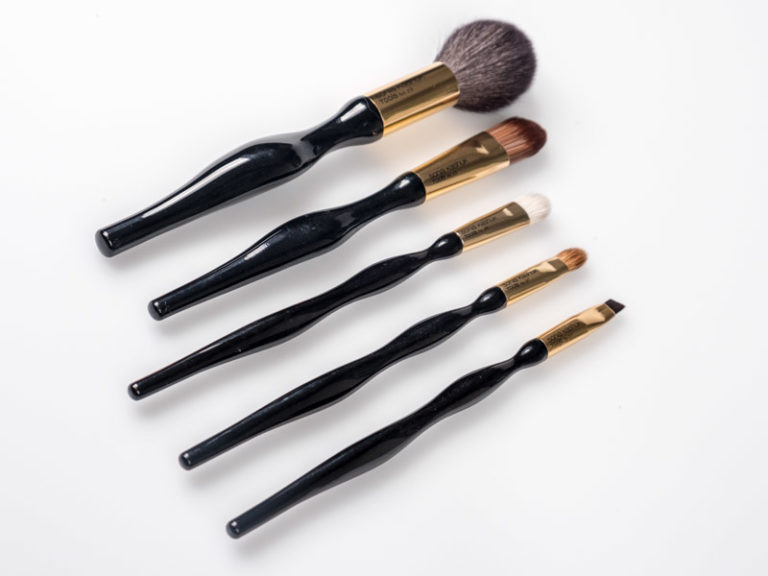
Sonia Kashuk’s foundation and blush brushes were outstanding, easily the best of all our budget contenders, providing a smooth, non-streaky application. And the dense, angled eyeliner brush allowed us to apply a thin, dark, precise line quite easily, unlike Real Techniques’ ($6-$21) angled liner, which was so soft that it lacked precision. The Sonia Kashuk brushes were also refreshingly easy to clean — while we had to dig out pigment stuck in the Real Techniques and Skinny Dip foundation brushes, Sonia Kashuk was pigment-free with a few swipes of cleaning solution.
The brand does feature an extremely contoured handle, which was polarizing for our testers — some found the shape too bulbous — but this design is a useful way to guide your hands toward proper positioning if you’re new to makeup brushes. Thicker brushes have one dip, while longer, thinner brushes have two dips so that you can switch between varying degrees of control
Sonia Kashuk also offers a lot of fun gift sets. We tested its Pleated Pink Brush Set($37), which comes with 10 brushes made of hard plastic shaped like pink unicorn horns — and which drew admiring compliments around the office. Especially compared to MAC’s terrible gift sets, we were impressed at how extremely soft and dense the Pleated Pink set’s bristles were, comparable to Sonia Kashuk’s regular line and possibly even a little softer. The brushes are awkward to hold, thanks to the top-heavy design, but for us, the quality of the bristles outweighed the gimmicky handles. The Pleated Pink Brush Set is limited edition, but Sonia Kashuk usually has several limited edition sets available at any given time, making this brand a solid gifting option. For people who are concerned about animal testing, Sonia Kashuk is also a cruelty-free brand that does not test on animals.
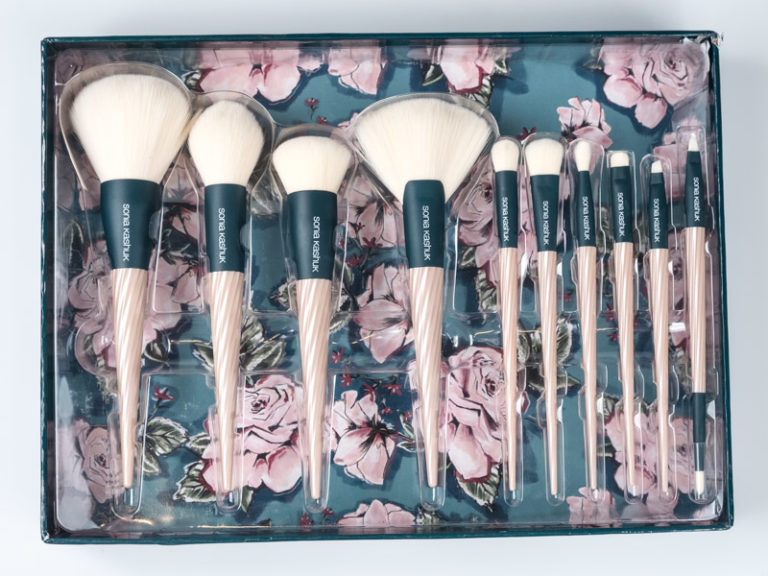
On an even tighter budget?
E.l.f.Surprisingly good performance given their rock-bottom price point.
We’d be remiss in talking about budget brushes without also mentioning e.l.f. ($1-$12). Despite having a rock-bottom price point (we bought its whole 12-brush set for $12), the brand was a surprisingly respectable runner-up to Sonia Kashuk. The brushes aren’t terribly dense, but we found our foundation and blush applied more smoothly than brands like Real Techniques ($6-$13). The only brush we wouldn’t recommend is e.l.f.’s eyeliner, which was so wide and soft that we ended up with thick, messy streaks. One tester reported her eyeliner took twice as long to complete (we tested the eyeliner brush e.l.f. includes in its set, but the brand does offer a handful of other models). Just be aware that e.l.f. brushes aren’t made to last: Coworkers who already owned them tipped us off that their glue tends to weaken within a year or so, causing the heads to fall off the handles.
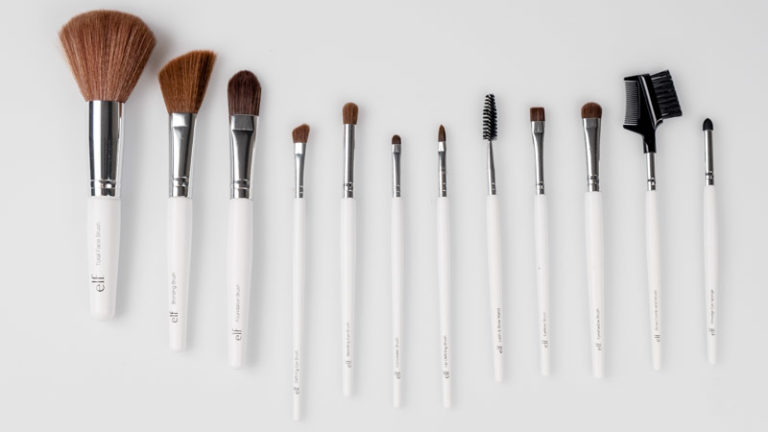
Did You Know?
There’s not a lot of transparency about what makes a brush “cruelty-free.”
Makeup brushes can be made of synthetic hair, or natural hair, which comes from animal fur. Most cosmetic brands offer a mix of brushes that utilize both hair types — but most don’t offer much transparency about the source of their natural hair, or how it’s obtained. We were able to determine that Tom Ford’s foundation brush is synthetic, while the cheek and eye brushes are made of natural hair, for instance, but we were unable to dig up further details. Adding to the noise, “cruelty-free” is not a regulated term, and sometimes there is no more than the brand’s word that it doesn’t test on animals. PETA and Leaping Bunny are third-party organizations that certify brands as cruelty-free, but this certification process is voluntary, and a brand does not need certification to lay claim to the label: Of our top picks, only e.l.f. and Sonia Kashuk claim to be cruelty-free, and only e.l.f. is third-party certified.
If this issue is important to you, a general rule of thumb is to make sure the makeup brands you use don’t sell in stores in mainland China, where animal testing is required by law for foreign cosmetics (companies selling online in China aren’t required to). A company’s policy on animal testing may change over time — one example is NARS, which recently began selling in mainland China — so if animal testing is a dealbreaker for you, we recommend keeping tabs on your favorite brands’ statuses, and only buying from companies with a history of cruelty-free transparency.
Synthetic hair is more versatile than natural hair.
The general consensus among makeup experts — which we saw reflected in the brushes we tested — is that natural hair should only be used for powders, while synthetic hair can be used for liquids, gels, and powders. “You never really want to use natural brushes with a liquid or cream makeup,” Picou told us. “The hairs trap the product in. Synthetic is cheaper and easier to clean.”
If you have sensitive skin, dermatologist Tracy Evans, MD, also told us that it might be safer to avoid natural hair brushes, as “humans are more prone to developing allergies to natural/organic products in general.”
It’s important to wash your brushes regularly.
When we asked her about the correlation between makeup brushes and skin health, Dr. Evans told us emphatically to “wash your makeup brush after every use! Your brush accumulates bacteria with each use. Not washing brushes can lead to acne or worsening acne.” If that’s not enough reason, dirty brushes can also lead to spottier, more difficult makeup application.
Here’s how to wash ’em.
There are plenty of brush cleansers on the market, but you can also DIY your cleaning solution. Baby shampoo and tea tree oil, or olive oil and dish soap can help keep your brushes germ-free. Regardless of cleanser, follow these steps:
- Wet the bristles with lukewarm water. Don’t wet the ferrule (the metal piece joining the bristles to the handle), which can weaken the glue inside and cause bristles to loosen.
- Gently swirl the brushes against soap in your palm.
- Rinse the bristles, and run them gently over a clean paper towel. Repeat until the water runs clear and there are no more traces of makeup when running the brush against the towel.
- Lightly reshape the brush head, and lay brushes horizontally to dry, preferably hanging off a counter, to retain their fluffy shape. Don’t set your brushes vertically with the bristles pointing up to dry — that can cause water to run into the ferrule and weaken the glue.
Wash at least once a week to help brushes last longer, and avoid storing damp brushes in dark places like drawers or cabinets. Brushes used for liquid and gel makeup accumulate bacteria more quickly than powder brushes and should be washed more frequently.
The Best Makeup Brushes, Summed Up
This Great Post Originally Appeared On Reviews.com Here

![The Best Makeup Brushes [From Reviews.com]](http://www.slaybeautyworld.com/wp-content/uploads/2017/12/REVW2152-768x329.jpg)
